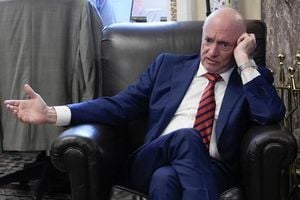On May 7, 2025, Giuseppe Castagna, the CEO of Banco Bpm, confirmed during a conference call that the bank is currently focused on its "stand alone path," which he described as "very satisfying for us." This statement comes in the wake of the passivity rule imposed on Banco Bpm following UniCredit's public exchange offer (Ops), which restricts the bank from exploring other options. However, Castagna hinted that if UniCredit were to step back, there might be opportunities to consider other potential avenues.
Castagna emphasized Banco Bpm's significant role in the potential consolidation of the banking sector in Italy, stating, "We consider ourselves an important part of the potential consolidation in Italy." He also noted that the completion of the product factory after the successful Ops on Anima has positioned Banco Bpm as a unique entity in the banking landscape.
The backdrop of these developments is a complex political landscape where the government, led by Prime Minister Giorgia Meloni, is grappling with the implications of market dynamics on its stability. The government's interventionist approach to the ongoing banking consolidation, particularly regarding UniCredit's aggressive maneuvers, has raised concerns among political analysts. While the ideological attacks on the government have been prevalent, the underlying market dynamics are proving to be a more pressing issue.
Recent polls indicate that Meloni's approval ratings have remained steady since September 2022, but the cohesion among the leaders of her coalition—Matteo Salvini and Antonio Tajani—could be jeopardized by the government's intervention in the banking sector. The ongoing battle over UniCredit's Ops, which has included attempts to acquire Banco Bpm and even a stake in the German bank Commerzbank, has become a flashpoint for political tensions.
UniCredit's CEO, Andrea Orcel, has faced significant pushback from the Italian government, which has imposed strict regulations under the Golden Power law, particularly concerning the acquisition of Banco Bpm. This law has created barriers that threaten to derail UniCredit's plans, prompting Orcel to seek a dialogue with the government. However, so far, these efforts have yielded little progress.
In a bid to assert its position, Banco Bpm launched a communication campaign that features the slogan: "One hundred and sixty years for our territories. That's why we say No to UniCredit's Ops." This campaign is a clear indication of the bank's resistance to the takeover and reflects Castagna's concerns about the uncertainty surrounding the operation.
Financially, Banco Bpm reported strong results for the first quarter of 2025, with total revenues increasing by 2.9 percent year-on-year to €1.476 billion. This growth was driven by a 6.2 percent rise in commissions, although the interest margin saw a decline of 5.5 percent due to falling rates. Notably, the net profit surged by 38 percent to €511 million, which could rise to €549 million when factoring in Anima's contribution. Castagna proudly declared these results as the best in Banco Bpm's history, indicating a strong performance amid the ongoing market turmoil.
As the deadline for UniCredit's Ops approaches, expected to close by mid-June, speculation is mounting regarding Orcel's next steps. Reports suggest that he is contemplating a withdrawal from the operation, though no official statement has been made. The lack of consensus among government leaders regarding the exercise of special powers related to the acquisition has further complicated matters.
Sources indicate that the coalition's leaders have struggled to reach an agreement on how to handle the situation, particularly concerning the restrictions imposed on UniCredit. While Forza Italia has shown some willingness to approve the government's measures, Tajani has been vocal about his opposition, insisting on documenting his party's dissent in the official minutes of the Council of Ministers meeting held on April 18.
This internal rift within the government is mirrored by differing opinions on how to approach the situation. Salvini has been particularly resistant to any negotiations that might ease the restrictions under the Golden Power law, a stance that aligns with the views of many in Meloni's party. In contrast, Tajani has consistently advocated for allowing market forces to dictate the feasibility of such operations, especially given the backing from both the Bank of Italy and the European Union.
The European Commission holds the authority to overturn government decisions regarding market consolidations under Regulation 139/2004, which mandates that such determinations be made by a community body, specifically the Directorate-General for Competition. This regulatory framework adds another layer of complexity to the ongoing negotiations and potential outcomes.
As tensions within the government continue to simmer, Orcel may be hoping for a concession that could facilitate UniCredit's ambitions. The stakes are high, not just for the banks involved but also for the broader Italian economy, which is navigating a challenging landscape marked by both political and market uncertainties.
In summary, the situation surrounding Banco Bpm and UniCredit illustrates the intricate interplay between politics and finance in Italy. As the government grapples with its response to market dynamics, the future of these banking entities hangs in the balance, with potential ramifications for the stability of the entire sector.




